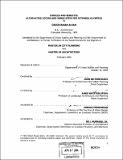| dc.contributor.advisor | John de Monchaux and Anne Whiston Spirn. | en_US |
| dc.contributor.author | Alkan, Özgür, BaÅ ak, 1977- | en_US |
| dc.contributor.other | Massachusetts Institute of Technology. Dept. of Architecture. | en_US |
| dc.date.accessioned | 2006-03-24T18:20:31Z | |
| dc.date.available | 2006-03-24T18:20:31Z | |
| dc.date.copyright | 2004 | en_US |
| dc.date.issued | 2004 | en_US |
| dc.identifier.uri | http://hdl.handle.net/1721.1/30111 | |
| dc.description | Thesis (M.C.P.)--Massachusetts Institute of Technology, Dept. of Urban Studies and Planning; and, (M. Arch.)--Massachusetts Institute of Technology, Dept. of Architecture, 2004. | en_US |
| dc.description | Some pages folded and some maps have transparent overlays. | en_US |
| dc.description | Includes bibliographical references (p. 152-154). | en_US |
| dc.description.abstract | This thesis is based on the idea that the Olympics, a global mega-project that interrupts and re-channels the forces of urban evolution in its host city, can be planned in ways that bring long-term benefits to that city. It is inspired by the urban regeneration of Barcelona in 1992 and the environmental achievements of the Sydney Olympics in 2000. The immense mobilization of resources for the Olympics, however, has a potential to deliver even more to the city. In this thesis, I will present an alternative Olympic plan for Istanbul, a three-time bidder for the Olympics that seeks to guide the city to a more environmentally sustainable future. I begin the thesis with twelve photographs that convey my observations of Atlanta, Athens and Istanbul, in the post-Olympic, pre-Olympic and bidding stages of Olympic development. The photographs reveal the significance of sports venue location and transportation choices for the Long-term impacts of the Olympic event on the environment. A quick survey of past host cities shows similar patterns of Olympic development; in Chapter I, I analyze the IOC's Manual for Candidate Cities to identify planning guidelines that limit planners' toolkit. Following a brief analysis of Istanbul's Olympic plan submitted for the 2008 Summer Games in Chapter I, I devote Chapter II to an exploration of environmental benefits that can potentially be derived from the Olympics, Laying down the conditions for their realization. | en_US |
| dc.description.abstract | (cont.) In Chapter III, I study the environmental history of Istanbul and generate a vision for a sustainable future that can guide site selection and transportation investments for the Olympics. The Alternative Olympic Plan for Istanbul introduced in Chapter IV is ambitious. It aims to reverse the trend of environmental destruction in Istanbul by channeling the city's growth away from environmentally sensitive zones in the north by strategically locating Olympic investments. The epilogue, in conclusion, contains reflections on the thesis topic and directions for future research. | en_US |
| dc.description.statementofresponsibility | by Özgür, BaÅŸak Alkan. | en_US |
| dc.format.extent | 154 p. | en_US |
| dc.format.extent | 10667212 bytes | |
| dc.format.extent | 10667018 bytes | |
| dc.format.mimetype | application/pdf | |
| dc.format.mimetype | application/pdf | |
| dc.language.iso | eng | en_US |
| dc.publisher | Massachusetts Institute of Technology | en_US |
| dc.rights | M.I.T. theses are protected by copyright. They may be viewed from this source for any purpose, but reproduction or distribution in any format is prohibited without written permission. See provided URL for inquiries about permission. | en_US |
| dc.rights.uri | http://dspace.mit.edu/handle/1721.1/7582 | |
| dc.subject | Urban Studies and Planning. | en_US |
| dc.subject | Architecture. | en_US |
| dc.title | Choices and benefits : alternative access and venue sites for Ä°stanbul Olympics | en_US |
| dc.type | Thesis | en_US |
| dc.description.degree | M.Arch. | en_US |
| dc.description.degree | M.C.P. | en_US |
| dc.contributor.department | Massachusetts Institute of Technology. Department of Architecture | |
| dc.contributor.department | Massachusetts Institute of Technology. Department of Urban Studies and Planning | |
| dc.identifier.oclc | 55695967 | en_US |
